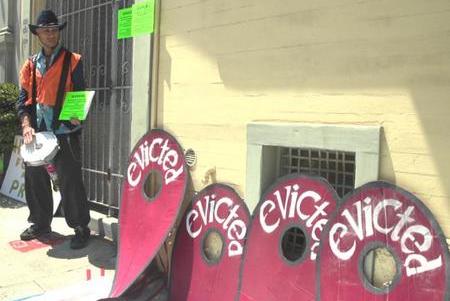Months ago, legislators approved several layers of protections to keep renters from being kicked out and potentially made homeless during a pandemic. Now, several of those protections are expiring, though there are efforts under way to extend them and Gov. Gavin Newsom has said he supports an extension.
San Francisco’s suspension of nearly all evictions, including for non-payment of rent, expired Dec. 1. While a federal eviction moratorium is in place until Jan. 31, at the moment, San Francisco tenants who can’t make rent because of the pandemic are also protected by a California law that bars landlords from evicting so long as tenants continue to pay a quarter of their rents. That law, AB 3088, expires at the end of January, but its author, Assemblyman David Chiu, has put forward a proposal that would extend those protections through the end of the year.
Without that extension, Scott Weaver, supervising attorney at the Eviction Defense Collaborative and a volunteer with the San Francisco Tenants Union, says he expects many landlords will move to evict non-paying tenants.
“We at the EDC are expecting an avalanche of non-payment cases,” he said. “We’ve never seen anything like this. This is — The dot-com bust in the early 2000s was nothing compared to this. The subprime failure in 2008 was nothing compared to this. This is huge.”
San Francisco renters are also protected from being evicted for not paying the rent they owed between March 16 and Sept. 30, 2020, but they still owe the accumulated debt from all unpaid rent. While state and local governments and legislators have recommended that renters and landlords work out a payment plan for the rent they can’t pay now, Weaver advised against signing anything.
“The problem with a payment plan is, for somebody who is not employed, there’s really no telling when you’re going to be employed again,” he said. “Promising money that you haven’t earned yet, and you don’t know whether you’re going to earn, I think is not a good strategy.”
For landlords, there is also the changing rental market to consider. San Francisco rents have dropped dramatically, changing the incentives for landlords, Weaver said.
“In the rental market that we’re used to, rents keep going up, up, up, and landlords have a financial incentive to evict because they can get more rent on a vacant unit.”
With depressed rents, that may no longer be the case, he said. “The landlord has to think about, well, what is the benefit to me of evicting this person when they may be able to pay it two months from now?”
That leaves the pressure on long-term tenants whose rents have been kept low by rent control, Weaver said, since the difference between their rents and what a landlord could charge even in the new slightly cooler market may be enough to create an incentive for a landlord to evict them.
For now, Weaver said he sees no indication that this cooling has stopped.
“There’s a whole bunch of stuff happening that suggests to me that we’re going to continue to see a downturn in rents,” he said.
A segment from our radio show and podcast, “Civic.” Listen at 8 a.m. and 6 p.m. Tuesdays and Thursdays at 102.5 FM in San Francisco, or online at ksfp.fm, and subscribe on Apple, Google, Spotify or Stitcher.










